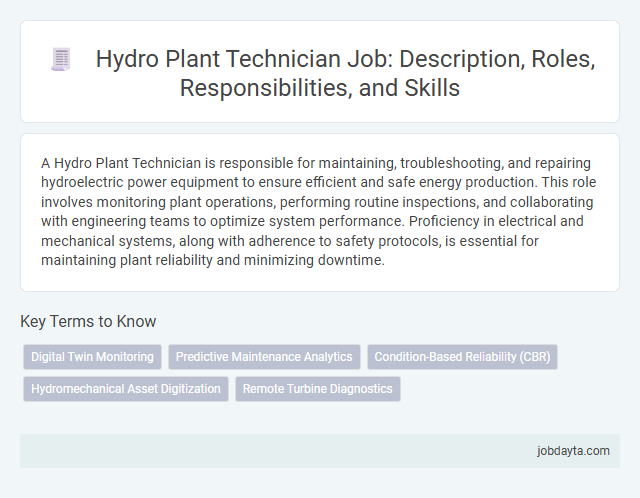A Hydro Plant Technician is responsible for maintaining, troubleshooting, and repairing hydroelectric power equipment to ensure efficient and safe energy production. This role involves monitoring plant operations, performing routine inspections, and collaborating with engineering teams to optimize system performance. Proficiency in electrical and mechanical systems, along with adherence to safety protocols, is essential for maintaining plant reliability and minimizing downtime.
Overview of a Hydro Plant Technician Role
What does a Hydro Plant Technician do in a utility setting? A Hydro Plant Technician operates and maintains hydroelectric power plants to ensure efficient energy production. Your role involves monitoring equipment, conducting inspections, and troubleshooting to maintain optimal performance.
Key Responsibilities of Hydro Plant Technicians
Hydro Plant Technicians operate and maintain hydroelectric power equipment to ensure efficient energy production. They monitor system performance, conduct regular inspections, and perform preventive maintenance to prevent downtime. Troubleshooting mechanical, electrical, and hydraulic issues is essential to maintain safe and reliable plant operations.
Essential Skills for Hydro Plant Technicians
Hydro Plant Technicians must possess strong mechanical and electrical skills to maintain and troubleshoot complex hydroelectric equipment efficiently. Proficiency in interpreting technical diagrams and monitoring control systems ensures optimal plant performance and safety. Strong problem-solving abilities combined with knowledge of environmental regulations are essential for sustainable and effective hydro plant operations.
Typical Work Environment in Hydro Power Plants
Working as a Hydro Plant Technician involves operating and maintaining equipment in hydroelectric power plants. Your role takes place in environments that combine advanced technology with natural energy sources.
- Indoor Control Rooms - These spaces house monitoring systems and control panels essential for managing plant operations.
- Mechanical and Electrical Areas - Technicians perform maintenance and repairs on turbines, generators, and electrical systems in these zones.
- Outdoor Hydro Facilities - Fieldwork includes inspecting dams, spillways, and water intakes exposed to varying weather conditions.
Hydro Plant Technician Job Description Explained
A Hydro Plant Technician is responsible for the operation, maintenance, and repair of hydroelectric power plants. These technicians ensure efficient energy production by monitoring equipment and performing technical inspections.
- Equipment Monitoring - Continuously oversee turbines, generators, and control systems to detect malfunctions early.
- Preventive Maintenance - Conduct regular inspections and servicing to minimize downtime and extend equipment lifespan.
- Troubleshooting and Repairs - Identify and resolve mechanical or electrical issues to maintain optimal plant performance.
Hydro Plant Technicians play a critical role in sustaining renewable energy generation and supporting utility infrastructure.
Safety Protocols and Compliance in Hydro Plant Operations
Hydro Plant Technicians play a crucial role in maintaining safety protocols within hydroelectric power facilities. Strict adherence to these protocols ensures the protection of personnel and equipment during operations.
Your compliance with established safety standards minimizes the risk of accidents and operational disruptions. Regular inspections and monitoring of machinery are essential for identifying potential hazards early. Training on emergency procedures and proper use of personal protective equipment (PPE) reinforces a safe working environment in hydro plant operations.
Tools and Technologies Used by Hydro Plant Technicians
Hydro Plant Technicians utilize advanced diagnostic tools such as vibration analyzers and thermal imaging cameras to monitor the performance of turbines and generators. They rely on specialized software for real-time data analysis to ensure optimal operation of hydroelectric systems.
Technicians employ precision instruments like multimeters and pressure gauges to inspect electrical circuits and hydraulic components. Cutting-edge technologies, including SCADA systems, enable remote control and automated monitoring of hydro plant equipment.
Career Path and Advancement Opportunities in Hydro Power
Hydro Plant Technicians play a critical role in maintaining and operating hydroelectric power plants. Career paths in this field offer growth through technical expertise and leadership roles within the renewable energy sector.
- Entry-Level Technician - Focuses on routine maintenance and monitoring of hydro plant equipment to ensure efficient energy production.
- Senior Hydro Plant Technician - Oversees advanced troubleshooting, system optimization, and mentors junior staff to enhance plant performance.
- Plant Supervisor or Manager - Leads operational teams, manages safety protocols, and coordinates large-scale projects to expand hydro power capabilities.
Educational Requirements and Certifications for Hydro Plant Technicians
| Educational Requirements |
|
|---|---|
| Certifications |
|
Challenges Faced by Hydro Plant Technicians and How to Overcome Them
Hydro plant technicians encounter challenges such as equipment wear and unpredictable water flow impacting power generation efficiency. Regular maintenance and advanced monitoring systems are essential to mitigate these issues and ensure continuous operation.
Technicians also face safety risks from high-pressure water systems and electrical hazards within the plant environment. Comprehensive safety training and strict adherence to protocols reduce accidents and improve workplace safety.
Related Important Terms
Digital Twin Monitoring
Hydro plant technicians utilize digital twin monitoring to create precise virtual replicas of hydroelectric systems, enabling real-time performance analysis and predictive maintenance. This technology enhances operational efficiency by identifying potential faults early, optimizing asset management, and reducing downtime.
Predictive Maintenance Analytics
Hydro Plant Technicians leverage predictive maintenance analytics to monitor equipment health and forecast potential failures using real-time sensor data and machine learning algorithms. This approach minimizes downtime, optimizes turbine efficiency, and extends asset lifespan by enabling proactive repairs in hydroelectric power plants.
Condition-Based Reliability (CBR)
Hydro Plant Technicians implement Condition-Based Reliability (CBR) by utilizing real-time sensor data and predictive analytics to monitor turbine performance and detect early signs of equipment wear. This proactive approach reduces unscheduled downtime, optimizes maintenance schedules, and extends the lifecycle of critical hydroelectric components.
Hydromechanical Asset Digitization
Hydro plant technicians specialize in hydromechanical asset digitization to enhance operational efficiency and predictive maintenance of turbines, generators, and control systems. Implementing advanced sensors and IoT technologies enables real-time monitoring and data analytics, reducing downtime and optimizing hydroelectric power generation.
Remote Turbine Diagnostics
Hydro Plant Technicians specializing in Remote Turbine Diagnostics utilize advanced sensor data and real-time monitoring software to detect performance anomalies and optimize turbine efficiency. Leveraging SCADA systems and predictive analytics, they minimize downtime and extend equipment lifespan by promptly addressing maintenance needs.
Hydro Plant Technician Infographic

 jobdayta.com
jobdayta.com